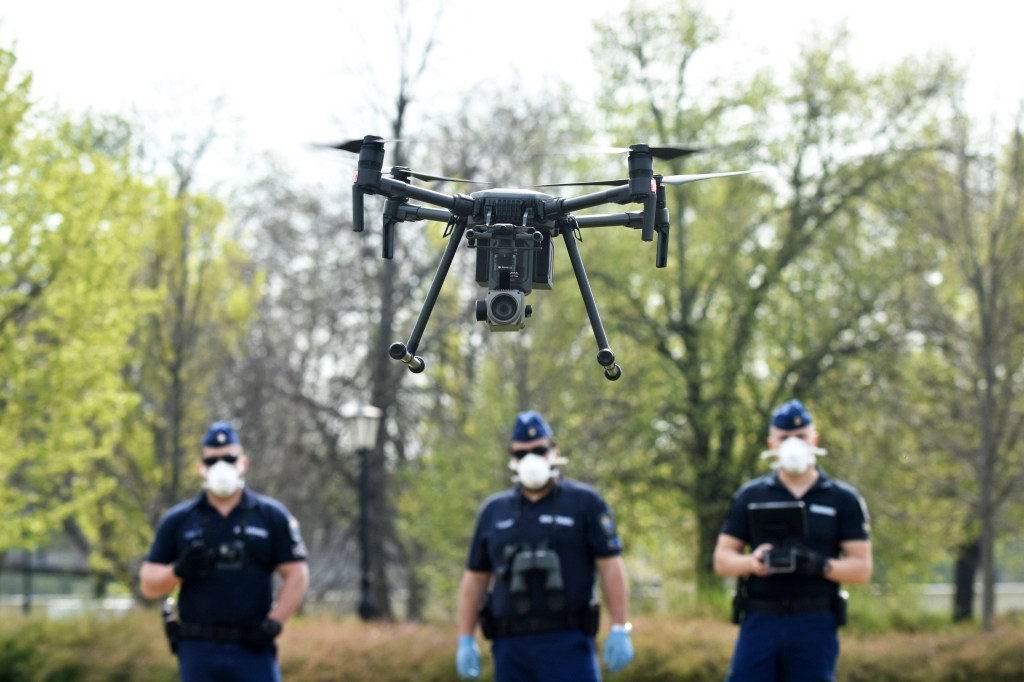Berlin, October 28, 2020 — Hungarian police must stop harassing journalists Gabriella Horn and Balázs Gulyás, and drop any investigation into their sources and their use of drone footage to report on information of public interest, the Committee to Protect Journalists said today.
On October 26, the business crime unit of the Hungarian police in Fejér County in Székesfehérvár, a city in central Hungary, summoned Gabriella Horn, a reporter for investigative news outlet Átlátszó, to appear for questioning, her employer reported. The move followed a summons for questioning to Balázs Gulyás, a reporter for independent news website Magyar Hang, on October 22, 2020, his employer reported.
Magyar Hang and Átlátszó said that the summonses followed their publication on May 8 and May 15, respectively, of stories that used drone footage to report on two military-grade armored vehicles parked on the estates of a company owned by businessman Lőrinc Mészáros in Bicske, a town 30 km from Budapest. Mészáros is a former gas pipe-fitter and a childhood friend of Prime Minister Viktor Orbán, who became a billionaire thanks to his ties to the government, according to reports by The New York Times and Bloomberg.
Horn and Gulyás told CPJ via phone that police summoned them as witnesses in a criminal probe into suspected illicit data collection by unknown perpetrators — a criminal offense punishable with a maximum prison sentence of three years, according to section 422 of the Hungarian criminal code.
According to Horn, the questioning — where she appeared without a lawyer — ended with signed witness testimony in which police asked why she wrote her article, why she thought it was newsworthy, who her sources were, who made the drone footage, and who authorized the publication of the article. According to the testimony reviewed by CPJ, Horn told police that she “wanted to verify information swirling in the press about armored vehicles stationing on the estate and find out how dangerous the vehicles are as she thought this fact might be of interest for the public. This was confirmed by the high number of visitors the article attracted.” Horn refused to answer questions about her sources.
Gulyás told CPJ via phone that police told him a company owned by Mészáros filed a criminal complaint, triggering their investigation. He said that he refused to answer any questions concerning his sources, on who made the recording and who authorized the article, and included a paragraph in his written testimony protesting the interrogation as judicial harassment and an attack on press freedom.
“Hungarian police must stop harassing Gabriella Horn and Balázs Gulyás and drop any criminal investigation related to their reporting, which used drone footage to reveal information of public interest,” said Gulnoza Said, CPJ’s Europe and Central Asia program coordinator. “It is every journalist’s job to hold powerful business leaders with close ties to governments accountable. Trying to intimidate journalists is unacceptable, and will only reinforce suspicions that authorities have something to hide.”
Balázs Tóth, Átlátszó’s lawyer, said the police investigation is unfounded as the journalists did not use drone recording to invade privacy but to verify information of public interest, Átlátszó reported. According to Tóth, who cited former Hungarian court decisions and resolutions by the Hungarian National Authority for Data Protection and Freedom of Information, it is legal to use drone footage in cases that serve the public interest without infringing on the privacy of an individual.
In an emailed response to several questions from CPJ, Lieutenant Colonel Tamás Henyecz of the business crime unit of the Hungarian Police in Fejér County sent one sentence saying that his investigation proceeded under a particular law regulating criminal procedures.
In an email to Magyar Hang on May 5, 2020, before the publication of the article, the communication department of Mészáros Group, a holding company belonging to Lőrinc Mészáros, said its use of assets is legal and has been reported to authorities. Quoting Paragraph No. 2:48 of the Hungarian civil code, the email, which CPJ viewed, warned Magyar Hang to request prior approval to produce and use video or audio recording, adding, “in the absence thereof, its disclosure constitutes an infringement.”
Mészáros declined to comment to Átlátszó. The news outlet reported that the Hungarian Army used similar vehicles until the end of 1980s, and they are now mostly used by collectors or for hunting. Mészáros is a hobby hunter and owns a hunting company, according to Átlátszó and an interview he gave to a Hungarian hunting blog in 2018.
Editor’s note: CPJ’s Europe correspondent, Attila Mong, is a supervisory board member of Átlátszó. The fifth paragraph has been modified to correct the nature of Gabriella Horn’s testimony.
